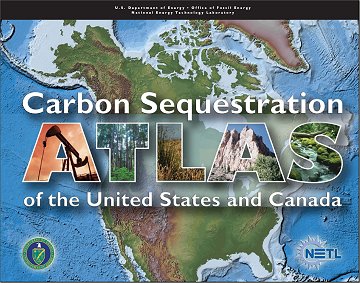Carbon Sequestration Atlas of the United States and Canada
Fair Use Statement
Sponsors
<- Return to Climate Change Maps

Foreword
The Department of Energy�s (DOE�s) National Energy Technology Laboratory (NETL) is proud to release the first Carbon Sequestration Atlas of the United States and Canada. Production of this Atlas is the result of cooperation and coordination among carbon sequestration experts from local, state, and government agencies, as well as industry and academia. This Atlas presents the first coordinated assessment of carbon capture and storage (CCS) potential across the majority of the U.S. and portions of western Canada. The Atlas also provides an introduction to the carbon storage (sequestration) process, summarizes the DOE�s Carbon Sequestration Program, and gives information about the CCS contributions from each Regional Carbon Sequestration Partnership (RCSP) to date.
One of the key questions concerning CCS is: how much potential is there to effectively help address global climate change? As shown in this Atlas, CCS holds great promise as part of a portfolio of technologies that enables the U.S. and the rest of the world to address climate change while meeting the energy demands of an ever increasing global population. The Atlas includes the most current and best available estimates of potential carbon dioxide (CO2) sequestration capacities determined by a methodology applied consistently across all of the RCSPs. All data were collected before December 2006. In the course of developing these CO2 sequestration capacity estimates, it became clear that some areas had yielded more and better quality data than others. Therefore, it is acknowledged that these data sets are not comprehensive; it is, however, anticipated that CO2 sequestration capacity estimates as well as geologic formation maps will be updated annually as new data are acquired and methodologies for CO2 sequestration capacity estimates improve. Further, it is expected that, through the ongoing work of the RCSPs, data quality and conceptual understanding of the CCS process will improve, resulting in more refined CO2 sequestration capacity estimates.
About this Atlas
The Carbon Sequestration Atlas of the United States and Canada contains three main sections: (1) Introduction, (2) National Perspectives, and (3) Regional Perspectives. The Introduction section contains an overview of CCS technologies, a summary of the DOE�s efforts in the CCS area, a brief description of the RCSP Program, and information on the National Carbon Sequestration Database and Geographic Information System (NATCARB). The National Perspectives section provides maps showing the number, location, and magnitude of all CO2 sources in the U.S. and portions of Canada, as well as the areal extent and capacity of geologic CO2 sequestration sites evaluated within the RCSP Regions. The National Perspectives section also contains a summary of the methodologies and assumptions employed to calculate the estimated CO2 sequestration capacities of various geologic formations. (Appendix A contains the complete �Methodology for Development of Carbon Sequestration Capacity Estimates� document.) The Regional Perspectives section includes a detailed presentation of CO2 sequestration capacity assessments for each RCSP based on these methodologies and assumptions.
Access the Atlas
The Atlas is available in two forms. You can view an interactive version or download the PDF version (22mb). If this link does not work, we have also made the Atlas available on our website (Note that the Atlas is a 22MB PDF file. Works best to right-click your mouse and save the link to your computer).
News about the Atlas
Green Car Congress - New Atlas Details More Than 3.5 Trillion Tons of Possible CO2 Storage
Capacity in US and Canada. The Department of Energy�s (DOE) Regional Carbon Sequestration Partnerships have identified carbon storage capacity in the US and Canada of more than 3.5 trillion tons. That�s approximately 900 years of storage for stationary CO2 emissions generated at today�s rate of 3.8 billion tons per year. Note that the link to the Atlas at the bottom of article is wrong. Use the links above to the PDF report and the online version of the Atlas.
<- Return to Climate Change Maps
| 




